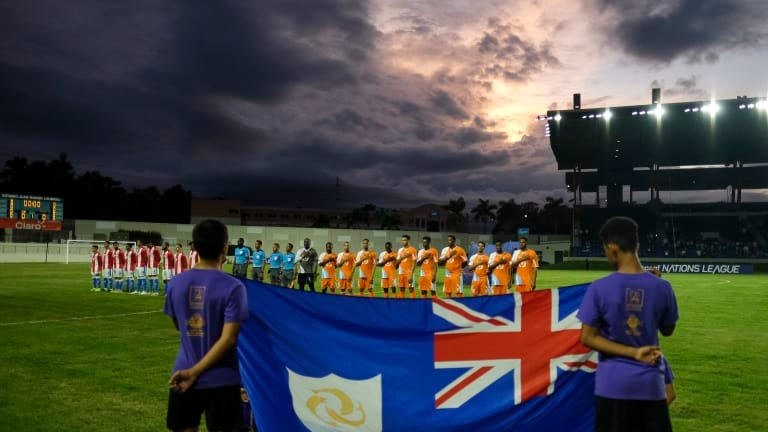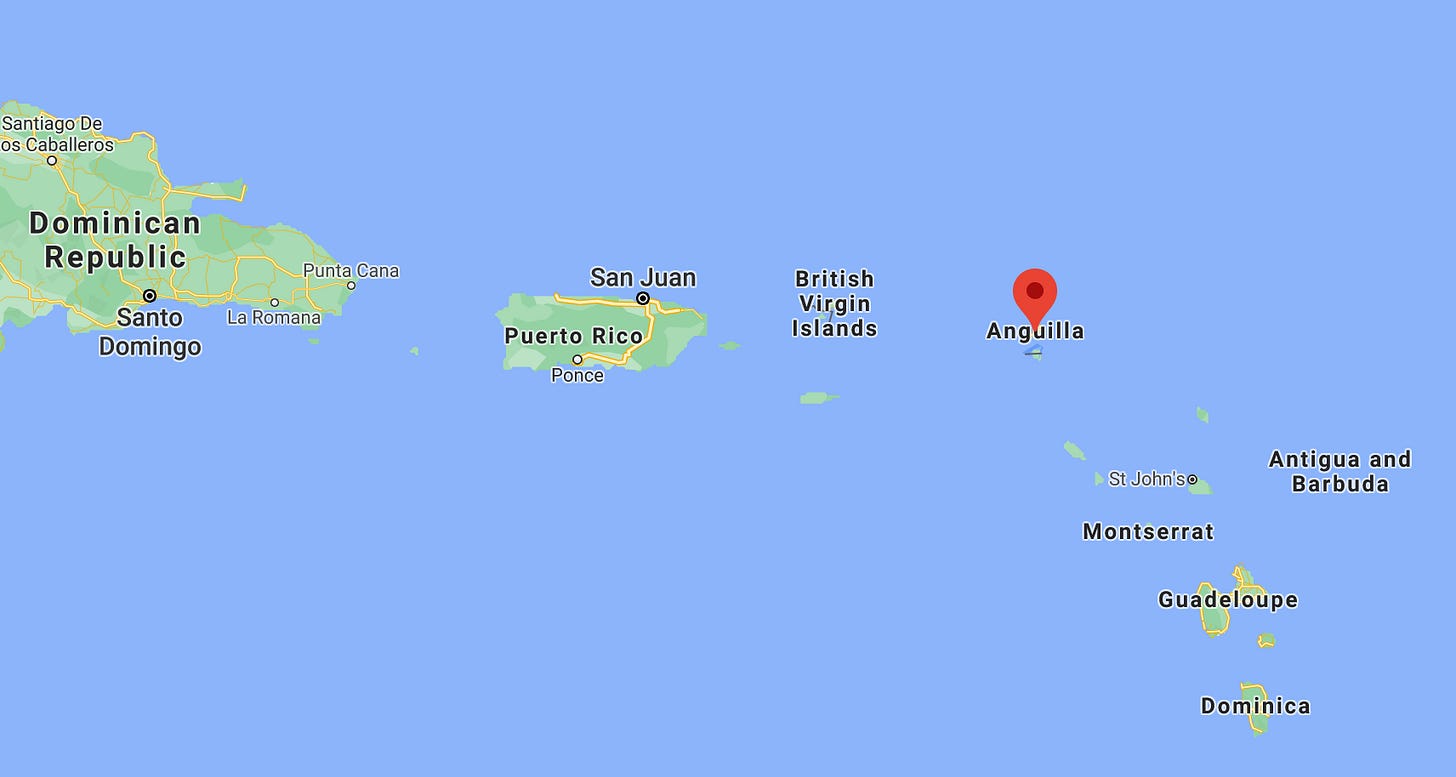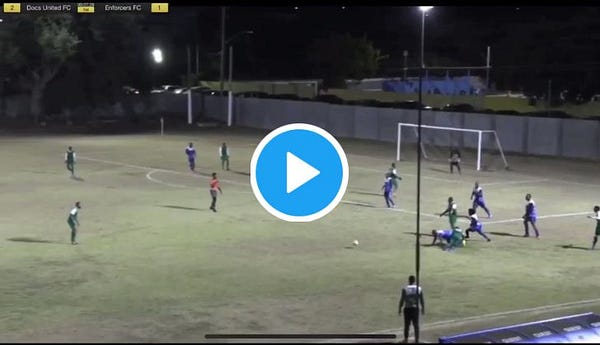🇦🇮 - The worst team in the world's plan to get rid of that label
Anguilla is 209th in the FIFA rankings but is investing in its grassroots to improve - and bringing in a Concacaf legend to help in the short-term.
Scroll down the FIFA rankings, past Belgium, Brazil, Mexico in the top ten, even past Botswana, Andorra and stop just before you get to the end. That’s where, at spot 209 out of FIFA’s 210 senior male national teams, you’ll find Anguilla. Prefer the Elo rankings? Anguilla is 233, above six teams from Oceania but otherwise below everyone, including the San Marino side they sit above in the FIFA rankings and even below non-FIFA teams like the Vatican.
Now pull up Google Maps. Scroll to Puerto Rico. Zoom in and move east. That’s where you’ll find Anguilla again, a small island with a population of around 15,000, a self-governing territory of the UK that started playing international soccer in 1985 and still is looking for its first-ever win in an official match.
“For us, we realize that we are ranked where we are in Concacaf and FIFA at the bottom of the table, and we want to change that,” said Anguilla FA president Girdon Connor, whose five goals wearing the national team shirt also tie him as the team’s all-time top scorer. “However, we acknowledge and realize that won’t happen immediately or overnight. We believe it has to be an approach where we attack it from both angles.”
The attack is underway. With the help of a Concacaf legend, a strengthened recruitment strategy and a grassroots program that has been growing steam rather than losing it during the global pandemic, Anguilla is hoping to ambush an unsuspecting team to secure that first-ever win in an official match, and they don’t want it to stop there.
Anguilla’s FIFA ranking is not a secret - on the island or off it.
“People do” bring it up to Germain Hughes, a 23-year-old defender who made his debut for the national team at age 15. “We play football here and play at a decent level but when it comes to international level, we don’t get results. So everybody’s like, ‘Oh, he’s playing so good here but when he’s playing international football it’s a different thing.’”
While jibes from friends and family get old, Connor, elected as FA president in late October 2019, said the label as the region’s worst team drives him.
“It has created a certain passion for me to want to see Anguilla really do well,” he said. “I wouldn’t say I get mad, but I take that ranking as my motivation to move Anguilla forward.”
Worse than what people on the island say, though, is the impact it can have on the standing of Anguillian football worldwide. While other Caribbean rivals like Montserrat are on the rise thanks to recruitment efforts in the diaspora community in the United Kingdom, Anguilla doesn’t always get the answer it’s looking for from eligible players.
“The players now at a higher level, because of our position and ranking, are not always willing to risk their reputation,” technical director Colin Johnson said.
That’s one of the reasons the country now is turning to a Concacaf legend, bringing former Trinidad and Tobago international Stern John to lead the senior men’s national team.
Since his long playing career with clubs such as the Columbus Crew, Birmingham City and Nottingham Forest ended, John has slowly been building his coaching career, serving as a head coach in the Trinidad and Tobago domestic league and assisting the senior and youth national teams.
In addition to international savvy, John brings instant credibility to the Anguilla program.
“Part of the effort to bring in an international coach is also to help with our recruitment efforts,” Connor said. “We’re serious about bringing players into the team that have value and trying to attract players at the best level back to Anguilla.”
While that may make life more difficult for local-based players like Hughes, he welcomes the challenge, not only because of increased internal competition but for what he hopes will lead to more opportunities abroad.
“If it takes us bringing 12 players from overseas with Anguilla heritage to improve our ranking, that’s what I want to see,” said Hughes, who played semipro in England and was set to play professionally in Gibraltar last year before the club’s financial problems meant he was unable to debut. “I want to see Anguilla move upward. If I go on a professional trial and they say, ‘Oh, you’re from Anguilla,’ it’s very difficult. Everybody writes you off before you even kick a ball, so it’s, like, so, so tough.”
Nigel Connor, a former Anguilla international who John is replacing as manager but will stay on as an assistant, also is open to external competition. Connor is looking forward to learning from a more experienced professional and has no issues at all with the way the FA approached it. That’s good for the holiday dinners, since he and FA president Girdon are cousins.
While happy to have John’s influence coming in, Nigel Connor still felt he achieved a fair amount over the last two years, even if the long-awaited win in an official match didn’t come. Anguilla managed a draw against the Bahamas in a Nations League qualification contest in 2018 and the coach saw the team grow in its technical ability.
“When I started and took the job, we were not doing well,” Nigel Connor said. “We were not possessing, we weren’t moving up the field. For me, I don’t think we saw pattern play. We were just defending and putting it out.
“I thought at least to put in some metrics that show we are improving, that we can aim for some of those things: To possess, to move the ball up the field, to be comfortable with the ball and defend and not be afraid.”
Those basic skills may be escaping players raised on the island, which is why this year has seen an increased push to market and invest in the grassroots game. Recruiting players of Anguillan heritage currently in the lower leagues in England may work for a few years, but Anguilla FA leaders feel they can have sustained success if they teach a love for the game at a young age.
Those efforts took a step forward this year, with the COVID pandemic providing more opportunities, not fewer, for local football to shine. Anguilla doesn’t have an ICU on the island and has kept strict travel regulations in place since the beginning of the pandemic, when three cases were detected in the country. All three of those people recovered and the local league quickly resumed with both the men’s and women’s competitions - which is set to add a pair of teams next year after playing with five teams since 2002 - able to add a cup competition as well. That drew regional attention, since Anguilla was the only competition in the Caribbean underway, and most matches were streamed online. Competitions associated with the island’s lone secondary school also continued.
There remain obstacles to soccer’s success, including wooing kids away from other popular sports like track and field, tennis, and cricket.
“This is a very small island, so the same kids and players are doing everything, mainly on the timing of the year,” Girdon Connor said. “We’re trying to change that and make football the preferred sport.”
That’s not where the challenge ends to be competitive on the senior level. Nearly every national team player works full-time, many in the hotels that help drive the island’s tourism industry. That means trying to schedule shifts around training times and often leads to players missing training altogether.
“I can understand a lot of them not coming to training much because they have to provide for their family,” Hughes said. “It makes it difficult, even with the training numbers at time. Sometimes we have 15, sometimes 25.”
Still, Nigel Connor, himself a civil engineer and project manager by day, would love to see more commitment to the national team from the local players.
“I know that we are not one of the top-ranked teams, but it must mean something to play for your nation,” he said. “Sometimes, it doesn’t feel that persons have that drive and carry the flag proudly enough. I’m a former national player. We’d have stayed in the trenches and done anything to make our country proud.”
He and others try to stay patient, knowing that things won’t improve overnight.
“We have just revised our long-term strategic plan,” said Johnson, the technical director. “Of course, we see it’s not something that you’re going to address in the next year or two but five to ten years down the line. We’re going to address different areas in stages.”


Even so, the idea that Anguilla might not get only its first goal from open play in World Cup qualification (two penalty kicks are so far the only marks on the scoresheet for Anguilla in WCQs) but also its first-ever victory is a dream most can’t keep from dancing into their heads.
“I don’t think we’re going to beat Panama, and the Dominican Republic is another top team in the region, but if we can put up a result against Dominica or Barbados, I think people would start to look at us,” Hughes said. “We have a new coach, we have a new president, we have a new structure.
“There’s a whole new look in Anguilla, so with that I think people are going to start looking at us differently. If we could pull a result in those two games, I think it’s possible.”
If not, the plan for Anguilla will remain the same: Improve from the top by recruiting the best eligible players, improve from the grassroots by funding programs and academies and show the world that they no longer belong among the worst.













Can't we let small nations band together to make larger teams that can actually field a credible team, like what international cricket does with the West Indies team? Play for your country in small-time CONCACAF competition, but play as a regional all-star squad in FIFA competition / WCQ.
Another one of CONCACAF's smaller members who are STILL suffering from the theft of millions of dollars of FIFA Aid that would have helped GROW their national team programs. There are still plenty of those who are free walking the streets who were in power in CONCACAF who need to be indicted, convicted and sentenced for their corrupt soccer work for the past 20 plus years.